On February 21, 2022, Russian President Vladimir Putin announced the recognition of the occupied territories of Luhansk and Donetsk oblasts as separate “republics,” and on February 24, he proceeded with the war, seizing new territories of Ukraine, despite the fact that the Russian army was supposed to “liberate” (in fact – occupy) the parts of these oblasts that it had failed to seize in 2014.
Even the inhabitants of the occupied territories were not ready for such a turn of events. In mid-February, before the invasion, the paratroopers began to mass-deport women and children to Russia, arguing that “Ukraine was going to attack.” Men, on the other hand, were not allowed to leave the ORDLO (Separate Regions of Donetsk and Luhansk Oblasts). There were some limited options to leave, but the “L/DPR” groups quickly blocked these channels.
The paratroopers began to proactively hunt men down – kidnapping them in the streets, forcibly taking them away from their workplaces and preventing them from getting in touch with their family. In time (sometimes a month or more), those men would find a way to call their relatives and tell them that they were fighting, and not in their own region, but far beyond their borders. In Kharkiv, for example. Their wives’ appeals to the so-called command yielded no results.
On March 27, the leader of the “LPR” paratroopers Leonid Pasechnik announced a so-called “referendum” on the “republic’s” accession to Russia for the first time.
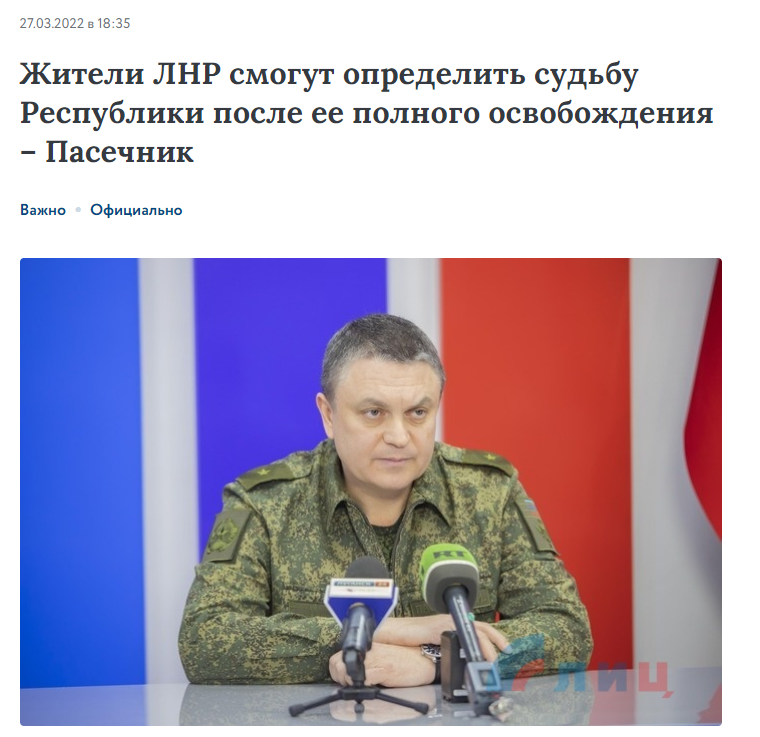
Screenshot from the LPR group’s website LIC
Even though the groups usually make their statements on anything in a synchronized fashion, the “DPR” leader Denis Pushylin made no such statement on that day. In the temporarily occupied part of Donetsk oblast, the subject of a “referendum” is not popular for obvious reasons: the battles for Donetsk oblast are still ongoing. At least the “DPR” group-controlled website DAN writes about the “referendum” much less. Meanwhile, most of Luhansk oblast has been occupied. The North was almost unscathed. And the people who remain in the cities that suffered severe destruction (Severodonetsk, Lysychansk, Rubizhne) can be fed promises about fast restoration, no specific time frames mentioned. Some of the journalists who would make trips to these cities up to the very last moments believe that the majority of those who stayed are genuine supporters of the “Russian world.” So, in general, the promises will be believed.
For two months, the LPR group made no mention of the “referendum” either, because the fighting was ongoing. Instead, on June 4, Sergey Mironov, the head of the “Just Russia – Patriots – For Truth” party, announced the territory’s “accession” to Russia as he illegally visited the occupied territory of Luhansk oblast.
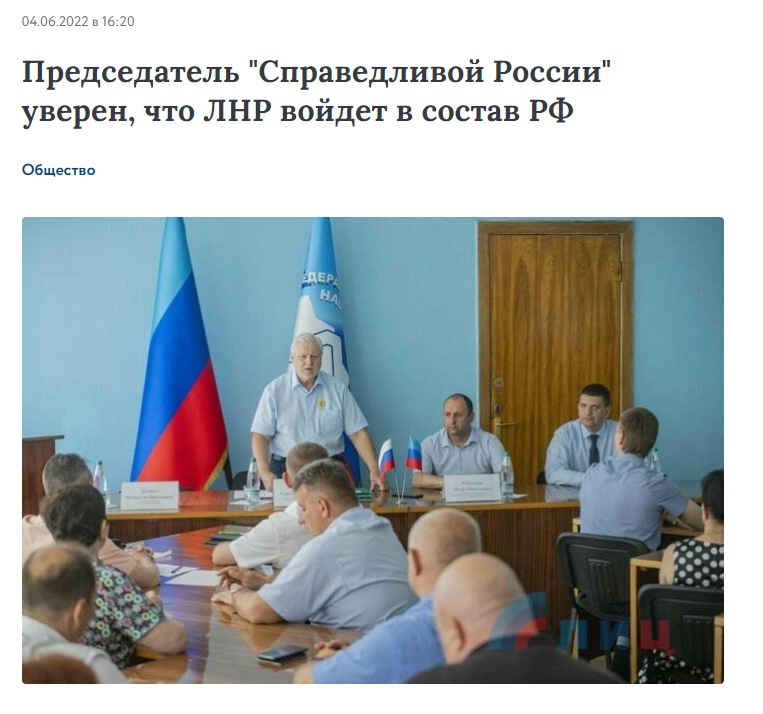 Screenshot from the LPR group’s website LIC
Screenshot from the LPR group’s website LIC
“In May 2014, our party officially adopted a resolution on the recognition of both the ‘LPR’ and the ‘DPR.’ Over the years, we have repeatedly appealed to the president with a proposal to recognize the independence of the ‘republics.’ But time has done its job. Now we are waiting for you in the Russian Federation. I’m sure it will happen soon,” Mironov said during a meeting with representatives of the “LPR Trade Unions Federation.”
And here the question arises: how are these territories to become part of Russia? Judging by the words of Leonid Pasechnik, Russia has not decided this yet.
10 days after Mironov’s statement, he said that “the possible status of the ‘LPR’ in the event of joining the Russian Federation will be determined during the referendum” and expressed confidence that “the majority of local residents will vote for the territory joining Russia.”
Why the “LPR” group is not mentioning any specific dates becomes clear from the statement of the leader of Russian State Duma’s LDPR faction Leonid Slutsky, made during his visit to occupied Luhansk on July 9.
On the one hand, Slutsky says, “It is up to the ‘LPR’ people and no one else to determine if a referendum is needed and the possible terms of it being held,” and on the other hand, he says, “If other regions freed from ‘Nazism’ want to hold a referendum on the future of their territory, their ‘republic,’ too, it would make sense to hold them together.”
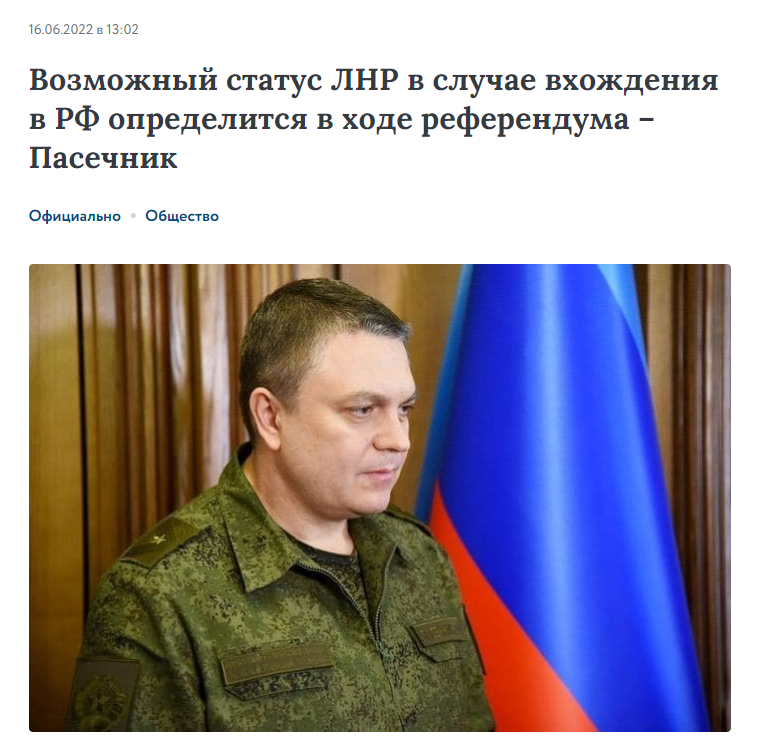
Screenshot from the LPR group’s website LIC
On the same day, July 9, Denis Miroshnichenko also stated that a “referendum” would be impractical. For the past few years, he has been calling himself “the chairman of the ‘LPR’ parliament.” In his opinion, it is better not to go through with this out of safety considerations.
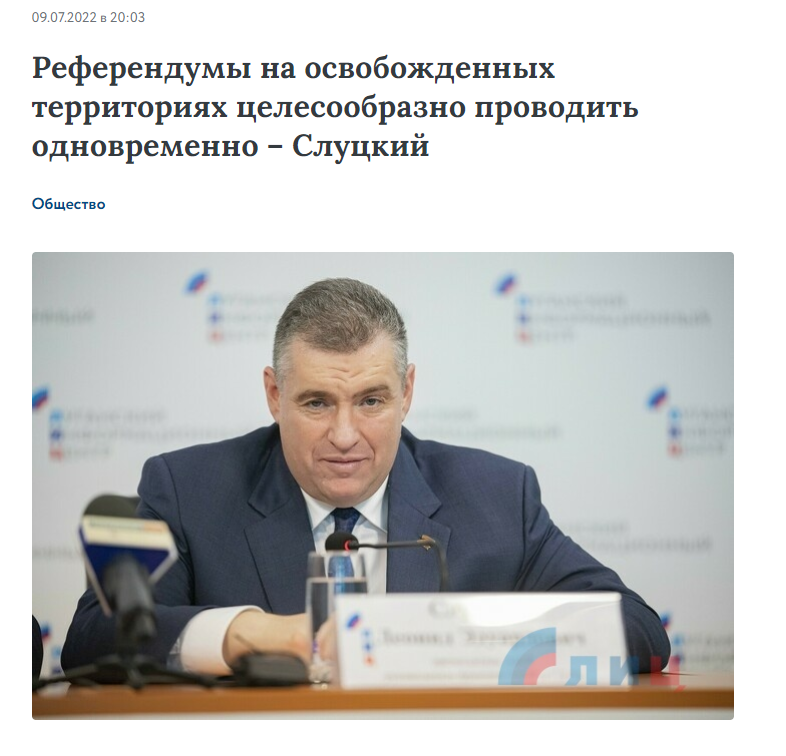
Screenshot from the LPR group’s website LIC
But no later than in a week, the “LPR public chamber” proposed to establish a headquarters to prepare for the “referendum on the LPR’s accession to the Russian Federation.” Believe it or not, the decision was unanimously supported. And the one to announce it was (again, you will not believe me) Denis Miroshnichenko. The one who had spoken about the impracticality of a “referendum” a week earlier. Now he assures us: there is a demand from the people.
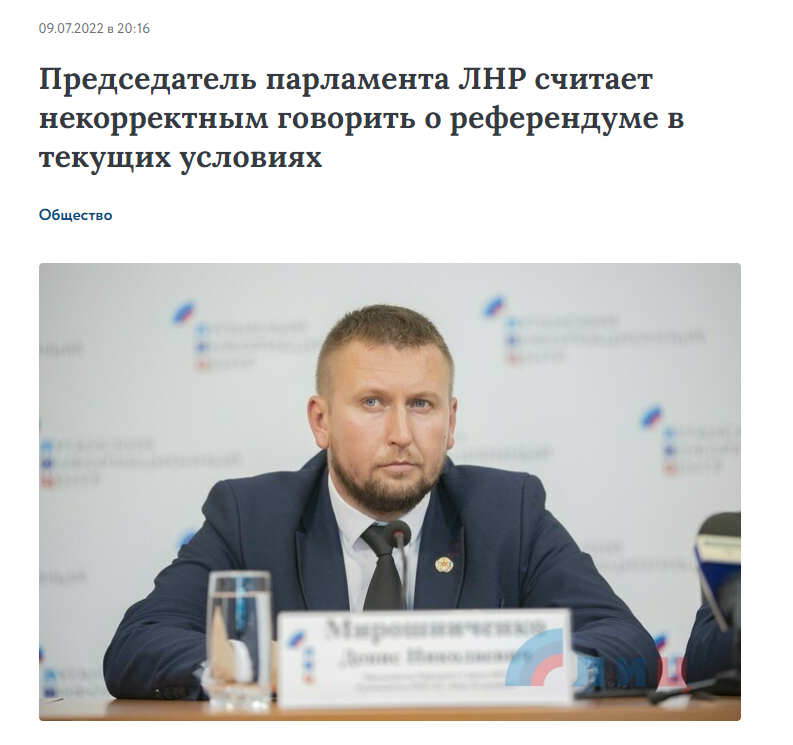
Screenshot from the LPR group’s website LIC
And the very next day after this very unexpected statement, a wave of demonstrations in support of this so-called referendum swept throughout the occupied territory of Luhansk oblast. According to the LIC website, controlled by the “LPR” group, on July 16, these demonstrations took place in Kirovsk and Alchevsk, on July 17 – in Rovenki, on the July 18 – in the newly occupied Markivka district, on July 19 – in the Sverdlovsk district.
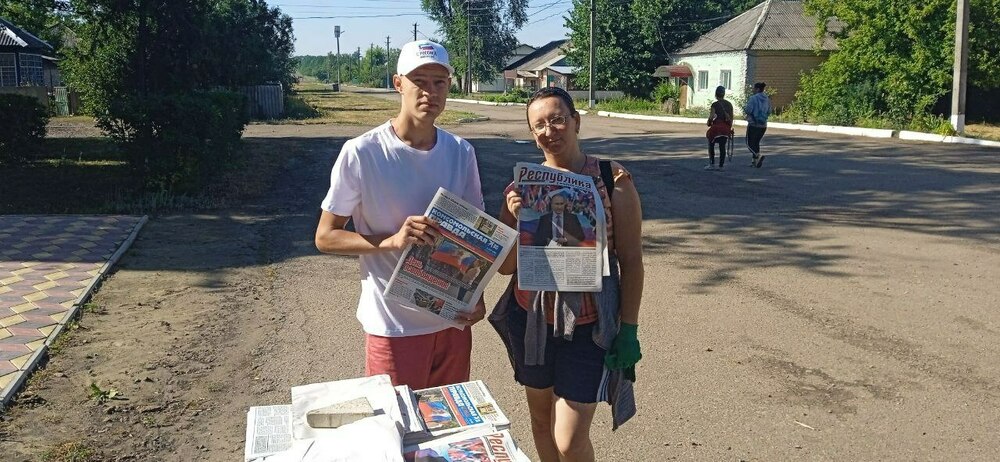
Propaganda in Markivka district. Photo: the LPR group’s website LIC
According to the Eastern Human Rights Group, similar events also took place in Debaltseve and Starobilsk.
The format of these “demonstrations” is the same absolutely everywhere: people in t-shirts and baseball caps with the print “With Russia forever” handing out propaganda newspaper Respublika to passers-by. And that is it.
“Propagandists from among local residents are giving out the Respublika newspaper with a picture of Putin. The activists’ daily wage is 50 hryvnias, or 150 rubles. The campaign is planned to continue until August 3,” the human rights activists’ statement reads.
That is, the occupiers have started an ordinary propaganda campaign, where, as you realize, they will have no rivals.
Moreover, amindst the preparations for the pseudo-referendum, they have started to further clean up the media space in the territory under their control. Namely, from July 27, the Alchevsk weekly Rio-Plus would cease operations (the newspaper had been in print since 2002 and was one of the few privately owned media outlets in the occupied territory), and subscribers will receive the newspaper Express-Novosti instead, with which Rio-Plus will merge. They allegedly promise to keep the Alchevsk editorial staff.
“As for the occupied territories of Kharkiv, Kherson, and Zaporizhzhia regions, the process there continues with delays, the “referendum” commissions are only just being created there, no campaigning is being conducted, and passports of the Russian Federation are being issued very slowly,” notes head of the Institute for Strategic Studies and Security Pavlo Lysyansky.
According to his information, the so-called “referendum” will include two questions:
1. The “L/DPR’s” “accession” to the Russian Federation;
2. The “L/DPR’s” “independence.”
And despite the fact that the “LPR” group is seemingly seriously preparing to hold it, the seesawing around the referendum does not stop: on July 25, an “LPR” paratrooper Alexei Karyakin, who calls himself “a member of the staff for the preparation of the referendum on the ‘LPR’s’ accession to the Russian Federation” said that he considers it unfair to hold a “referendum” before “the DPR is liberated.”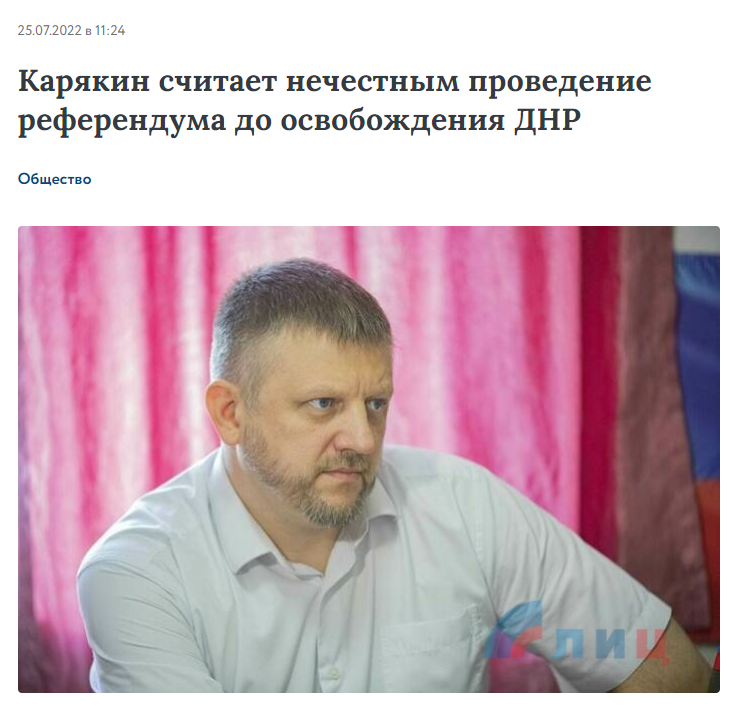 Screenshot from the LPR group’s website LIC
Screenshot from the LPR group’s website LIC
In June, Pavlo Lysyansky reported that a “referendum” in the occupied territories of Luhansk and Donetsk oblasts was set to be held on September 11. Although, the groups have not named the exact date yet, because it largely depends on the situation on the front line, where the Russians have not made any significant gains in recent weeks.
In his comment on the possibility of a “referendum,” given on the air of the All-Ukrainian telethon, the adviser to the head of the President’s Office Mykhailo Podolyak noted:
“First. There are no ‘LPR’ or ‘DPR.’ In terms of international law, there are no Russian territories. There is a territory of Ukraine. They (groups, Russians. – Ed.) can announce whatever they want. They are not going to use tactical nuclear weapons for one simple reason: for an attack on a sovereign state, a response will follow. These are all special propaganda traps that they set. Second. There will not and cannot be any ‘referendums.’ This is all an internal game.”
Using the example of Kherson, Podolyak noted that there is no one to hold such a “referendum” there: there are not enough collaborators there even to organize a “referendum,” let alone to vote on it.
“Look, this is not the 2014 Crimea, when everyone was hysterical and no one understood what the ‘Russian world’ was. Now, I’m sure, Crimea also realizes what the ‘Russian world’ is, which is why they are so afraid today. Therefore, there is not, and cannot be, any ‘referendum’ infrastructure,” said Podolyak, and added, “Third. Who said that the Ukrainian army, the Ukrainian Armed Forces, will calmly look at all these manifestations of separatism? Our army, let’s say, will be calmly carrying out de-referenduming work. Namely: pre-“referendum” campaigns with the message that they (Russians. – Ed.) can only hold all those referendums in their destitute regions. And finally, fourth. They can not just recognize a territory as having this or that status, because in 1991, the international community only recognized these territories as part of the sovereign state of Ukraine.”
Valentina Troyan, Hromadske Radio presenter, IMI representative for the occupied territories